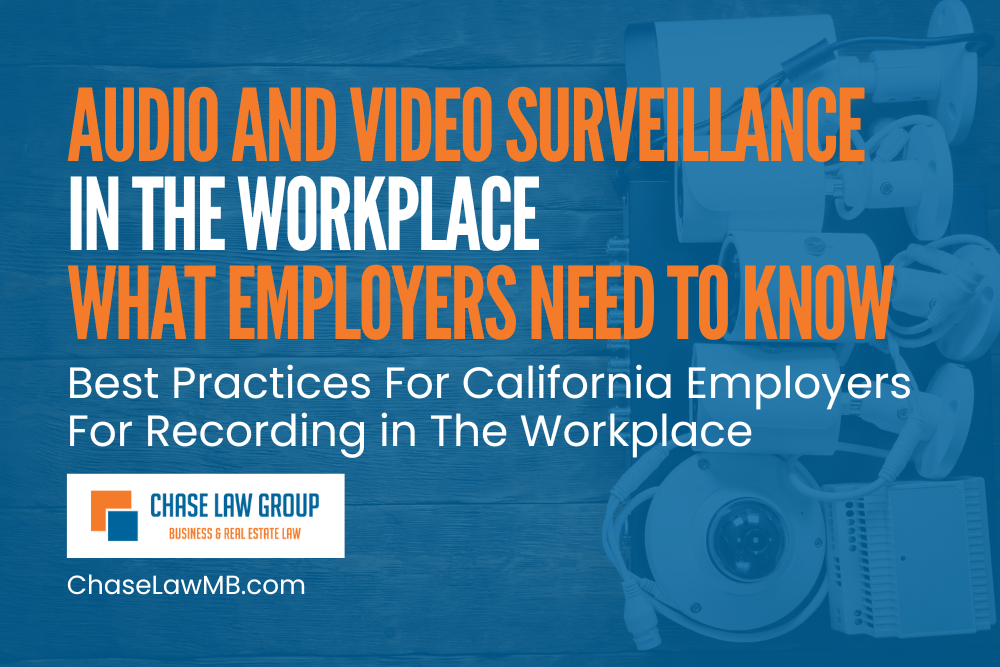Audio and Video Surveillance in the Workplace: What Employers Need to Know
By Admin February 21, 2023 Category: Business Law Tags: audio recording at work business law business privacy california labor laws california privacy laws chase law chase law group Employee Privacy employee rights employment law Legal Compliance los angeles employment attorney privacy compliance privacy policy privacy rights recording at work Recording Laws scott k liner security cameras in the workplace surveillance laws Video Recording at work Workplace Privacy

There are a number of reasons that California employers may consider audio or video recording in the workplace, including security, safety, and/or to monitor their employees’ and customers’ behavior in their place of business. However, before doing so, employers need to understand the various rights and restrictions related to recording in the workplace.
Video Recording
As a preliminary matter, despite an employer’s desire to record what goes on at their place of business, the California Constitution guarantees the privacy of its citizens in the workplace, schools, government buildings and other property. Courts and the legislature have determined that this right to privacy only applies when there is a reasonable expectation of privacy and of being left alone. In that regard, California has expressly prohibited video recording in specific locations where there would be an expectation of privacy, which includes restrooms, showers, locker rooms, and dressing rooms. Lunchrooms and break rooms may also count as private areas. California also specifically prohibits surveillance mirrors (mirrors that appear normal but are see-through on one side) in private areas such as showers and changing rooms. Generally, areas where there would be an expectation of privacy such as in someone’s office, video recording would also be prohibited. However, open areas, parking lots, lobby areas and anywhere else where someone cannot legitimately say that they would have a reasonable expectation of privacy are areas where video recording can be conducted.
Audio Recording
California is a two party consent state with regard to audio recording private conversations. See California Penal Code section 632a. Therefore, if the conversation is private it cannot be recorded without the express permission of the other party. Nevertheless, conversations are not considered private and can be audio recorded within the meaning of the criminal code if they are recorded for legitimate purposes, such as for safety, and in public locations within the workplace, such as common or open work areas and walkways. To determine if recordings are offensive, California courts may consider the time and length of the recording, as well as who captured the recording, and who has access to it. Employers are advised to seek legal advice before audio recording as it is important to ensure that the complete circumstances of any recording are considered to ensure that rights to privacy are not violated.
For businesses with customers who enter the workplace such as restaurants, or stores, employers must also be aware that they do not infringe upon the customers’ rights to privacy. Such areas where there would typically be no expectation of privacy would include a hotel lobby, a hostess area of a restaurant, or open work spaces. That being said, every situation is different depending on the circumstances of the business establishment.
Employees cannot secretly record conversations in the workplace such as conversations with other employees or their supervisors, absent permission to do so. However, they may record union related activities and they can record workplace harassment in a public area as well as their own office space despite not having permission of the other party to the conversation.
Best Practices To Use Before Recording in the Workplace
Notwithstanding the rights to record based upon the discussion above, it is recommended that employers provide notice to both employees and customers regarding the employer’s intentions to record them in their business/workplace. With regard to employees, employers should include a provision in their employee handbook wherein they disclose that audio and video recordings will be present in the workplace in permitted areas and identify those areas. Be sure to obtain the employees’ signatures acknowledging their receipt and agreement to the policies and provisions in the handbook. This will eliminate any argument that there was an expectation of privacy. Additionally, for customers and the public, signage should be used which notifies those entering the business that the business records both via audio and video in public/non private areas of the business (such as near a reception or hostess area or near a cash register. ) By doing so employers can clearly establish there is no expectation of privacy in those areas for which notice is provided.
Should you have any questions regarding your businesses rights to record in the workplace contact our employment attorney Scott Liner at [email protected] at Chase Law Group or call 310-545-7700.

